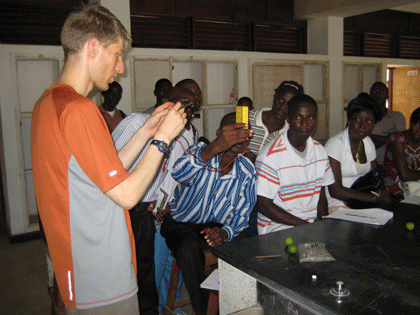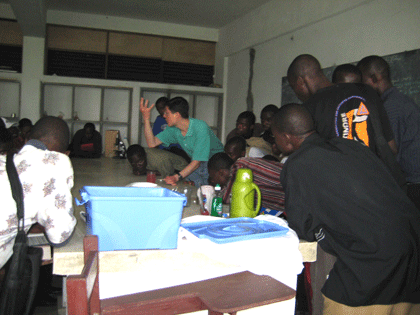Science Education in Liberia
with Benjamin I. Rapoport, Harvard MIT MD-PhD program
Abraham Jabateh, I-Help Liberia Project
Jonathan M. Hart, University of Liberia Medical School
Liberia is rebuilding after nearly 15 years of civil war. One of the chief impediments to growth is a lack of education. In particular, there are very low levels of literacy, numeracy, and familiarity with basic concepts of science, health and nutrition. Inspired by a Liberian teacher from our high school, Asumana Jabateh Randolph, Ben Rapoport and I spent two weeks traveling around Liberia developing science education programs.
Our goals were:
- To assess the state of science education in Liberia and to identify critical needs that we might be able to address;
- To form communities among Liberian educators to enable them to improve science education without foreign intervention;
- To develop sophisticated science laboratory exercises that can be performed cheaply and with locally available materials;
- To strengthen ties between Liberian scientists and educators and their counterparts abroad.
We visited the following institutions
- Booker Washington Institute. BWI is a technical and vocational high school in Kakata, Margibi County, about an hour outside of Monrovia. We worked with the teachers there to establish a science fair and to develop situationally appropriate laboratory exercises, such as: turning limes into batteries; quantifying the effect of exercise on heart rate; and extracting DNA from a tomato using a mortar and pestle, salt, soap, and rubbing alcohol.
- JFK Hospital. This is the Monrovia public hospital. We donated a microscope to their diagnostic lab and toured the ObGyn wards. Much of the equipment in the hospital has been broken by being plugged into outlets with the wrong voltage. There is no voltage standard in Liberia, and some outlets are 110 V and some are 220 V. The incubators for premature babies broke in this way, and the hospital has no working X-ray machine.
- Tubman National Institute of Medical Arts. TNIMA trains many of the country's nurses and is located next to the JFK hospital. The students report that their main challenges are finding a place to live and finding transportation to and from the campus. The school has no functioning labs or training facilities. We tried to help the students organize to pool their money to buy a microscope.
- Ministry of Education. We met with Minister of Education, Dr. Joseph Korto, and his staff. We advocated the development of a laboratory science curriculum based on locally available materials. Here are the slides we presented at the MOE.
- All University Science Teachers Association. We held a meeting at the Ministry of Education for teachers from several Monrovia Universities (University of Liberia, United Methodist University, Liberian Medical College). At the meeting, the teachers decided to form the All University Science Teachers Association, to promote outreach from universities to rural high schools and secondary schools.
- Liberian Women in Science and Technology. LWIST serves to advance women scientists and engineers. With this group we demonstrated how to extract DNA from a tomato. We also set up a mentoring program for high school girls interested in science at the College of West Africa, to be run by women at the United Methodist University which is next door.
- United Methodist University. We demonstrated how to turn limes into batteries, and taught the fundamentals of electricity. We toured the science labs, which contain a few pieces of broken equipment, but lack running water and electricity.
- College of West Africa. CWA is a high school next to UMU. We met with the Principal and discussed the mentoring program for high school girls interested in science.
- University of Liberia. At the Fendall Campus of UL we taught a biology class about DNA (with demos, of course!), a physics class about electricity (also with demos). We had a "town hall" meeting with chemistry and biology students, in which we encouraged them to set up an outreach program in which they teach science classes at a local high school. We also helped the students organize a fundraising effort targeting alumni. We hope to set up a science fair in which meritorious senior thesis projects are published in the newly created online journal, The Liberian Scientist. Possible future collaboration includes visits by foreign scientists to run "master classes" with the faculty at UL.
- Tubman High School. We met with the Association of High School Science Teachers, and explored their science labs. The Tubman labs are full of equipment which has never been used due to lack of training. We trained some teachers and students on the use of their equipment.
- University of Liberia Medical College. We met with the Deans and some students. Possible projects include visits by foreign medical students to study alongside the Liberian medical students. We also hope to donate USB memory sticks loaded with antivirus software, the full text of Wikipedia, and free medical textbooks. Many students have computers, but the Internet access is too slow to be useful.
- Smythe Institute. This private college teaches nursing and a little bit of computer science and agriculture. We were impressed by the level of the labs at this campus. We hope to work with Smythe to publish meritorious senior thesis projects in The Liberian Scientist.
- Rural teachers at Faith Academy, Ganta. The town of Ganta is a 5 hour drive from Monrovia, near the Guinean border. We noticed that malnutrition is a serious problem in the rural villages. The problem seems largely to stem from a lack of knowledge about basic nutrition, rather than from lack of access to food. So we talked to the teachers about nutrition and about the germ theory of disease.
- Muslim Youth Association for Peace and Development. We met with this group in Ganta, and talked to the Imam and the community Elders about the importance of science education. They showed us the Muslim School and the Mosque, both of which were destroyed during the war. Here is a letter they gave us soliciting help to rebuild their community.
- Church, Kakata. We went to a Sunday church service, and Ben gave a wonderful sermon on the importance of Science education.
Additional projects we hope to pursue include
- Setting up the online journal The Liberian Scientist. Senior thesis research projects by students at Liberian colleges and universities will compete to be posted online. The Liberian Journal of Science will be maintained by students at Hunter College High School in New York City and hosted through the I-Help Liberia project website.
- Arranging for US academics and medical students to visit the University of Liberia and the Medical School for periods ranging from a few weeks to a few months. The greatest need is for teachers to help educate the next generation of Liberian teachers and doctors. If you are interested, please email Adam, at: cohen@chemistry.harvard.edu, or Ben at: bir@mit.edu.
- Developing science laboratory exercises that can be performed at minimal cost using locally available materials.These laboratory exercises will be showcased at a "model lab" being set up by Jonathan M. Hart at Tubman High School in Monrovia.
- Making pictorial cookbooks to encourage people to eat a balanced diet. Many children in rural areas are malnourished, primarily because their parents do not know about basic nutrition. Jonathan M. Hart will work with students at Booker Washington Institute to develop nutritional cookbooks.
 |
Adam shows physics students at the University of Liberia how to turn a lime into a battery. We made series and parallel circuits out of our limes and measured the voltage and current. |
 |
Ben teaches biology students at the University of Liberia how to extract DNA from a tomato, using products available in the local market. |
Documentation:
Journalist Michael Kpayili of the Liberian Times accompanied us for much of the trip and wrote a series of articles on our activities
- Liberia: Two Harvard trained Science experts arrived in Liberia, June 8, 2009, by Michael Kpayili, The Liberian Times
- Liberia: Dr. Cohen lauds Hunter College High School for many donations to Liberian School system, June 9, 2009, by Michael Kpayili, The Liberian Times
- Liberia: Our Working Visit To Liberia- Working For A Cause, June 8, 2009, Benjamin I. Rapoport and Adam E. Cohen, The Liberian Times
- Liberia: I-Help Liberia Project donates Microscope to JFK medical Hospital, visits TNIMA, June 10, 2009, by Michael Kpayili, The Liberian Times
- Liberia: Dr. Cohen and Rapoport meet with Liberia Education Minister Dr. Joseph Korto, June 11, 2009, by Michael Kapayili, The Liberian Times
- Liberia: Visiting I-help Liberia/LIMANY Science delegation inspires students at UMU, UL and WIS with local materials for experiments, June 15, 2009
- Liberia: Two US scientits motivate Liberian teachers and students at UL, June 16, 2009, by Michael Kpayili, The Liberian Times
- Liberia: Two Young Harvard Scientists visit Liberia Medical College, June 17, 2009, by Michael Kpayili, The Liberian Times
- American Scientists Experience Liberian Tradition, Prepare Traditional Food, June 17, 2009, by Cholo Brooks, The Liberian Times
- Liberia: Visiting I-Help Liberia/LIMANY Science delegation distribute foot wears in rural Liberia, June 19, 2009, by Michael Kpayili, The Liberian Times
- Liberia: Harvard University Scientists Vist Rural Liberia; visit the Jabateh's farm in Kpein, June 22, 2009, by Michael Kpayili, The Liberian Times
- UL Chemistry Department Lists Myriad Problems, June 30, 2009, by Alaskai Moore Johnson, The Daily Observer